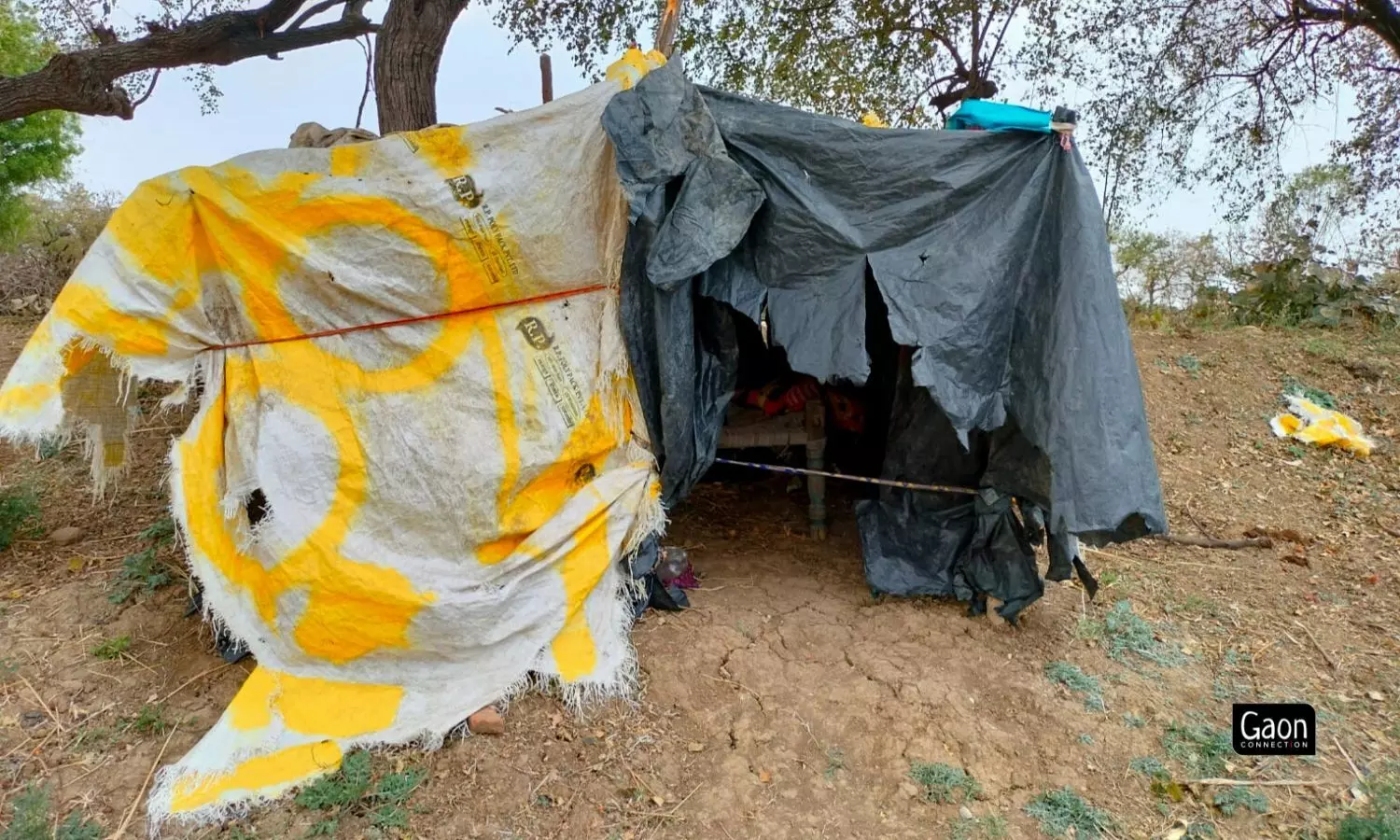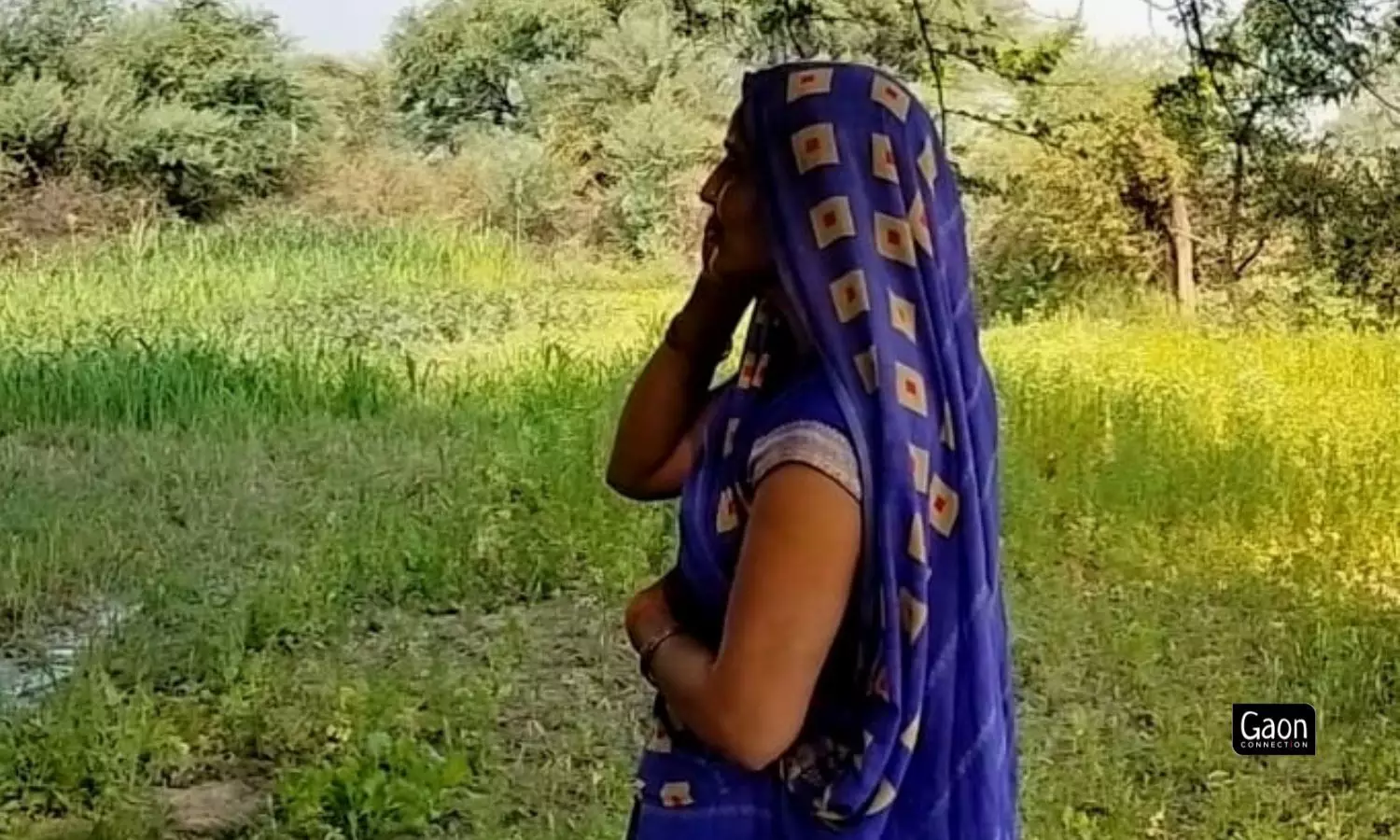Mahoba, Uttar Pradesh
The chow mein can wait. The matar paneer can wait. The gulab jamuns can wait.
In the rain-starved Bundelkhand region of Uttar Pradesh where people are swiftly embracing solar energy, there is a far greater question for the family to sit and resolve: When the family heads to a wedding, who will stay back to save the family’s most precious asset, the solar panels?
“Someone or the other has to stay back to watch the palate (solar panels). If we receive a wedding invitation, there is a long conversation in the family to decide who will stay back to guard the palate,” said Laxmi Devi from Tindaoli village as she adjusted the pallu of her synthetic saree.

Farmers have to sit in their fields through the day to guard their solar panels.
“Mostly it is either me or my devar who have to take turns to skip a wedding to guard the palate” the 45-year-old farmer told Gaon Connection.
Over 30 kilometres away, Badri Prasad Tiwari has a similar predicament. The resident of Supa village in Mahoba often finds himself at the receiving end of sarcastic jibes by his extended family members and relatives.
Tiwari has a strange problem. He is unable to accept any wedding invitations. And the reason to decline the invites is even stranger — the solar irrigation pumpset installed at his farmland.
“Byohaar pahucha de bas, plate ko akele kaise chhor devenge (I try to send the wedding gift through someone, how can I leave my plate alone),” said the farmer who dons the role of a chowkidar every night to guard the solar panels, which are locally referred to as ‘plate’.

Laxmi Devi is in a dilemma whether to attend her relative’s wedding or not.
Mahoba, which falls in the drought-prone Bundelkhand region of central India, is witnessing a solar revolution, with farmers switching from diesel-based irrigation pumps to solar-powered pumpsets. These irrigation pumpsets, for which farmers are contributing between Rs 72,000 and Rs 100,000, are helping them cultivate crops even in the rabi (winter) season.
But there is also a related concern of the theft of solar panels. Hence, farmers who have installed solar irrigation pumpsets have an additional task of guarding the ‘plates’.
Also Read: Rural areas to benefit on priority as UP plans to set up 18 ‘solar cities’
Every night, Tiwari is the caretaker of his solar panels, and if that means skipping weddings in the family, he has no choice. “I already suffered the loss of one plate. It burnt up abruptly, now should I risk another one just to attend a wedding?” asked the 72-year-old farmer.
“Na Bhaiya Na,” he himself answered.
Laxmi Devi’s devar (younger brother-in-law) Dharampal Rajput has been having sleepless nights since the family installed a solar irrigation pumpset in their farmland in February this year. He spends his nights in the khet to guard the plate and goes home only at six in the morning when Devi comes to the farmland to do chowkidari of the family’s prized possession, the ‘palate’.

Mahoba, which falls in the drought-prone Bundelkhand region of central India, is witnessing a solar revolution, with farmers switching from diesel-based irrigation pumps to solar-powered pumpsets.
Devi said that the solar irrigation pumpset had started to meddle with her rishtedari when she decided to seek help from her neighbours.
“I asked the neighbours if they can guard our palate when our family has a wedding to attend. Luckily they agreed. Thanks to their generosity, we can attend weddings as a full family and I do not have to choose between rishetdari and palate,” said the relieved farmer.
Also Read: Sustainable groundwater development through solar irrigation in India
But there are many farmers like Swami Prasad who neither have a family member nor a generous neighbour to guard the solar panels. ‘Apni Suraksha Apne Haath’ is the motto of such farmers.
Prasad from Lamora village in Mahoba keeps the starter of his solar-powered motor locked inside an iron dabba (box) kept at a corner of his khet. Meanwhile, he prays the solar panels attached to the motor are not stolen.

Some farmers walk an extra mile to safeguard their solar panels by bringing the ‘plates’ home after the crops are harvested.
“After I finish the day’s work and have to head back home, I lock the starter. It is important. I don’t want it to be stolen,” said Swami. “I don’t have the time to go through the laborious process of paperwork to claim compensation or replacement for the lost parts,” the farmer added.
Some farmers walk an extra mile to safeguard their solar panels by bringing the ‘plates’ home after the crops are harvested. For instance, in Tindauli village, the Gaon Connection reporter found several fields where rabi crops had been harvested and the fields were empty in preparation for the next crop cycle. Farmers had removed the solar panels from the large iron-stands on which the plates are fixed and taken the ‘plates’ home to keep them safe.
“Theft is an issue and thus many a times, farmers keep the plates inside their homes when irrigation isn’t needed,” Dharampal Rajput said.
It is a daunting task as one solar plate is approximately three feet by four feet in size. And to run a three horsepower pumpset, about 10 such plates are joined together.


















